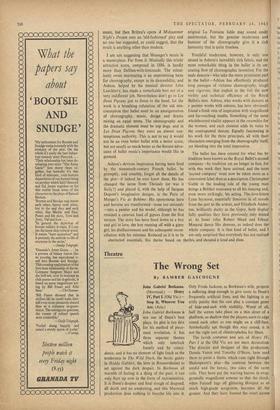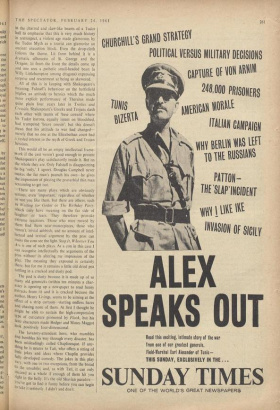Theatre
The Wrong Set
By BANKER GASCOIGNE John Gabriel Borkman is not one of Ibsen's best plays. Its plot is too thin for his method of piece- meal revelation, it has three separate themes which only interlock loosely and by coinci- dence, and it has no element of light (such as the tenderness in The Wild Duck, the hectic gaiety in Hedda Gabbier, the love in Rosmersholm) to set against the dark despair. In Borkman all warmth of feeling is a thing of the past; it can only flare up now in the form of recrimination. It is Ibsen's deepest and final slough of despond, all death and no awakening, and this Mermaid production does nothing to breathe life into it. Only Freda Jackson, as Borkman's wife, projects a suffering deep enough to give roots to Ibsen't frequently artificial lines, and the lighting is sc artily patchy that the cast play a constant game of hide-and-seek with visibility. Worst of all half the scenes take place on a thin sliver of r, platform, so shallow that the players seem to edge round each other as one might on a cliff-face Symbolically apt though this may sound, it is not the right sort of claustrophobia for Ibsen.
The lavish costumes and sets of Henry IV Part I at the Old Vic are not mere decoration The director and designer of this production Dennis Vance and Timothy O'Brien, have user them to point a theme which runs right througl Shakespeare's play—the contrast between tht sordid and the heroic, two sides of the saint coin. They have put the warring barons in exalt geratedly magnificent armour so that the shock when Falstaff lugs off glittering Hotspur as sc much high-grade scrap-iron, becomes all tht greater. And they have framed the court scenes
in the charred and claw-like beams of a Tudor hall to emphasise that this is very much history in restrospect, a violent age made glamorous by the Tudor Myth as a tourist. can glamorise an ancient execution block. Even the drop-cloth follows the theme. Lit from behind it is a dramatic silhouette of St. George and the Dragon; lit from the front the details come up and one sees a pathetic small-headed beast (a Willy Littlehampton among dragons) expressing surprise and resentment at being so skewered.
All of this is in keeping with Shakespeare's meaning. Falstaff's behaviour on the battlefield implies an attitude to heroics which the much more explicit performance of Thersites made quite plain four years later in Troilus. and Cressida. Shakespeare's Greeks and Trojans slash each other with taunts of `base coward' where his Tudor barons, equally intent on bloodshed, had trumpeted 'brave cousin'; but this doesn't mean that his attitude to war had changed— merely that no one at the Elizabethan court had a vested interest in the myth of Greek and Trojan heroism.
This would all be an empty intellectual frame- work if the cast weren't good enough to present Shakespeare's play satisfactorily inside it. But on the whole they are. Only Falstaff is disappointing (a big 'only,' 1 agree). Douglas Campbell never 'makes the fat man's paunch his own—he gives the impression of playing the proverbial thin man screaming to get out.
There are many plays which are obviously serious, even 'important,' regardless of whether or not you like them, but there are others, such as Waiting for Godot or The Birthday Party, which only have meaning on the far side of laughter or tears. They therefore provoke extreme reactions. Those who were moved by them find them near-masterpieces, those who weren't, trivial rubbish; and no amount of intel- lectual and textual argument by the pros can make the cons see the light. Stop It, Whoever You Are is one of such plays. As a con in this case I can recognise intellectually the arguments of the Pros without' its altering my impression of the Play. The meaning they expound is certainly there, but for me it remains a little old dried pea rattling in a cracked and dusty pod.
The pod is dusty because it is made up of so many old gimmicks (within ten minutes a char- acter is opening up a newspaper to read funny Rxtracts from it) and it is cracked because the author, Henry Livings, seems to be aiming at the effect of a strip cartoon--starting endless hares and chasing none of them. At first I thought he might be able to sustain the high-compression tYPe of caricature pioneered by Flook, but his later characters made Bodger and Moses Maggot look positively four-dimensional.
The lavatory-attendant hero, who mumbles and bumbles his way through every disaster, has been misleadingly called Chaplinesque. If any- thing he is nearer to Tati, who offers a string of little jokes and ideas where Chaplin provides fully developed comedy. The jokes in this play
vary, with one or two exceptions, from the broad to the unsubtle; and, as with Tati, it can only succeed as a whole if enough of them hit you right in the belly. It's the old Shavian paradox- VoWve got to find it funny before you can begin to take it seriously. I didn't and don't.







































 Previous page
Previous page